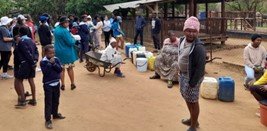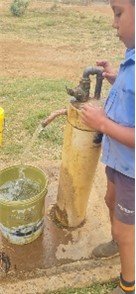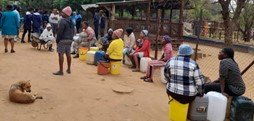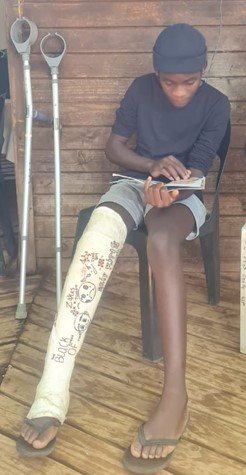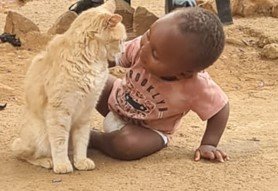2022 Spring Newsletter
Thank you for taking time to read our newsletter. It’s been awhile since our last letter, but please know we so appreciate you, our followers, supporters, and sponsors, without whom we could not continue.
BCDT’s post-covid challenges and interventions
Covid-19 and shortages caused by the war in Ukraine have increased poverty in the country, and BCDT has likewise not recovered to "normal” conditions. We have strengthened our village security to minimize and cope with increased substance abuse and its consequent family abuse and Gender Based Violence (GBV). The media dutifully reports the lengthy sentences for brutal crimes, yet the coverage seems to have little deterrence value.
BCDT’s women and children have not been spared, and remain vulnerable. One 11-year-old related that her fear builds from mid-week on – she knows that her safety evaporates as the weekend binge drinking begins. Another BCDT woman was recently coerced back to her abusive partner because he threatened to suicide if she left with their three children. The staff can do little, knowing the man could harm himself and his children if pushed too far.
BCDT has purchased whistles for every household so that women and children can quickly call for emergency help. It may also deter men banging on the doors of single woman households in the middle of the night, following a drinking binge. We want to stress that most BCDT residents are peaceful and law abiding. There are a few “bad eggs” however, who disrupt life and require intervention from police and BCDT staff. We remain constantly vigilant, knowing that one such person can cause untold damage for their victim(s).
The Cloete family continues to make inroads to diversity
Archbishop Desmond Tutu’ coined the term “rainbow family” to describe the post-apartheid South Africa. BCDT’s founders, the Cloete family, have Afrikaner, Dutch, British, French, and Spanish heritage, and are extending this rainbow even more. The three Cloete daughters chose partners from Pedi and Sotho tribal backgrounds, the second daughter Ndebele and third daughter married into a proud Black family with roots in activism in the USA. The Cloete’s’ great grandchildren are Xhosa. And finally, an albino boy child. A Rainbow Family indeed! All this in 32 years at the Botshibelo village.
The albino baby is beautiful. However in South Africa some believe albinos have special powers putting them at risk from organ traffickers. Education! Education!
We envisage a future exciting project for a documentary on Botshibelo’s “family”, all 190-strong, with DNA tests to track the ancient journeys of our lineage.
Water Crisis leads to water rationing
BCDT village water comes mostly from Johannesburg municipal water, supplemented by several small boreholes. The city and surrounding municipality have been experiencing a water crisis, with water unavailable for hours or days on end in some areas. The reasons are varied and complex, including broken pipes, leakage, power outages, and a heat wave. We are not alone in experiencing a shortage of potable water. But the shortages have hit BCDT villagers particularly hard.
The village homes have never had running water. There are several water tanks dotted amongst the shacks, with taps on each, and water pipes on the dirt roads connecting them. The tanks can be filled by water truck in the event of shortage. Villagers collect water from the taps in buckets for home use. When the water slowed, then stopped, the water trucks arrived and delivered water for a week, then did not return. Leigh organized groups of people to collect 40 liters at a time from the main borehole.
To understand the daily water crisis the villagers face, take a forty litre bucket of water, and use it to drink, bath, cook, wash the children, the dishes, clothes and clean the shack! Additionally, many of the food gardens have died, cutting precious vegetables out of diets.
Previous food shortages have caused some panic. But the effect of insufficient drinking water is next level suffering. Watching tired and dirty parents and children queuing all day to collect meagre amounts of water is heart-breaking.
Police “educate” MGS scholars on Police Brutality!
We would like to believe the country has made great progress since the dark days of Apartheid. Sadly, sometimes the actions of police and government officials make us wonder, as a recent “routine educational” police visit to the school demonstrated. Their monthly visit is intended to educate students on the dangers of drugs and crime. But it all went horribly wrong.
A grade 5 student, barefoot, shirtless and crying, ran to get a manager, reporting the police were attacking them. The manager arrived to discover the police officers had separated out perceived “troublemakers” and begun torturing them. A group of students were crouched with their hands behind their heads; every attempt to straighten their legs received a swift kick in the back of the knees. One Grade 8 student, Keabetswe, was later taken to hospital with a broken leg after being kicked. A group was forced to walk like disabled students while being verbally and physically abused. Other groups were forced to hand their shoes to the police officers, who used them to beat the students over the head.
When the manager demanded the police officers cease and desist immediately, they turned on masse to intimidate her. They screamed that the students needed to be taught discipline and respect, they smelled bad (never mind the severe water shortage!) and threatened that if their services and methods were not valued, they would no longer assist the village and school when problems arose.
But the manager held her ground, demanding the police leave immediately. When the students saw the police had been instructed to leave, they joined in and chased the officers to their cars. We managed to control the youth, attempting to explain such behavior in no way reflects the values of the new South Africa. But we knew our words rang hollow. The youth verified that that is often how poor youth are treated by the police. This one incident probably set back relations between our village and the police by a decade, sowing the seeds for future revenge and conflict.
Such incidents leave us in a precarious situation. BCDT does not want to open cases against police because often only anger and retribution comes of it, and because we do need them at times. We understand police perform an invaluable service and face daily trauma in the course of their duties. We would prefer the officers involved receive better training and anger management classes. But the area captain has refused to contact the school, in effect condoning the counter-productive behaviour of his officers.
And so, despite 200 students, teachers and staff having witnessed the abuse, we stand immobilized, preferring to focus our limited resources on the water scarcity and keeping the soup kitchen running, rather than on a fruitless effort to seek justice.
New drug scourge
A new and dangerous drug, Nyaope (or Whoonga) is beginning to make an appearance in the area, and we are providing counselling and education to combat it. It is a highly addictive street drug which is a mixture of low-grade heroin, cannabis products, and any number of dangerous cutting agents used to “bulk up” the drug, including pharmaceutical drugs and even rat poison. We provide constant counselling to an inner core family member who became addicted. Other youth have had complete mental breakdowns, and we are working with them and their families.
Lack of food the ultimate humiliation of a citizen
We continue to operate the soup kitchen to provide much needed relief from hunger in our village. At BCDT we have seen that when a person is hungry or starving, there is no energy for debates, every ounce of energy is required for survival. We thank you for your valuable contribution to this critical service.
The ‘sneaky’ 10-day spring break camp
Leigh and Nicole, the camping organizers informed everyone that they are too fatigued to camp during the 10-day spring break and would camp during the festive season holiday. However, somebody refused to accept “no” for an answer, and secretly set up the tents themselves, staying up late to repair their rickety tents. And as with so many things, it turned out to be one of the most enjoyable camping experiences yet.
Rabies Vaccination
The agricultural department completed a rabies vaccination program in the village, the first since Covid. We are grateful for this preventative measure which could save lives.
Electrical power - ongoing load shedding
Our energy utility, Eskom, lacks adequate power supply and frequently resorts to ‘load shedding’, which is a planned disruption of power to some customers to prevent a catastrophic grid failure. Aside from the disruption and inconvenience, we cannot buy bulk food specials requiring refrigeration. Security is also a serious issue during load shedding – theft of outside lights, cabling, and anything movable is a frequent occurrence.
We have experienced 1,949 hours [81 days] of load shedding this year, and Eskom informs us it will only get worse before it gets better.
In Closing
And so, we face scarcity, crime and corruption, and bullying by officials. But we press on, doing our best to keep the BCDT managers, parents and students thankful for small mercies, and hopeful for the future. We have run out of gas (literally!) but are cooking supper on a fire, with everyone sitting around it, discussing their day. There is always the warmth of community. There is always hope. There is always tomorrow.
Festive season will be here soon. Any assistance to make it more special and enjoyable for the children would be appreciated. Anything for the holiday camp, Christmas gifts, shoes, food, clothing, food for the animal shelter.
Thank you to all our supporters who provide us with the material, spiritual and emotional power to continue. Your caring and kind-heartedness resonates the African spirit of ‘Ubuntu,’ which speaks to your generosity, which you share with us unconditionally.
We love you guys!
Donations can be made on Angel-Strong.org (by credit card) or here on our website via PayPal.








